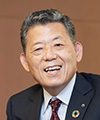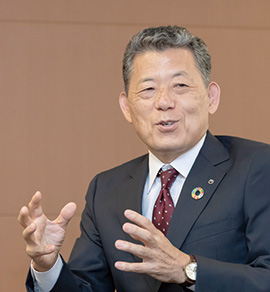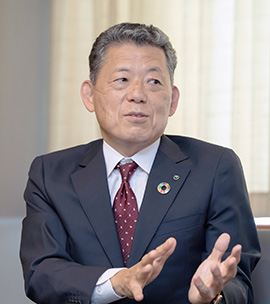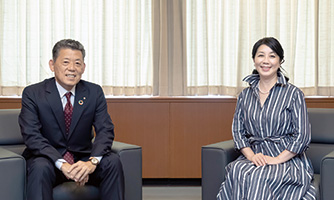 |
|
|
|
|
|
View from the Top Vol. 18, No. 9, pp. 1–5, Sept. 2020. https://doi.org/10.53829/ntr202009tp1
Live Under the Same Roof and Pass Down Tacit Knowledge for NTT WEST to Become a Social ICT PioneerOverviewAccording to a survey conducted by the Tokyo Chamber of Commerce and Industry in early June during the novel coronavirus pandemic, 67.3% of small- and medium-sized enterprises based in Tokyo have implemented teleworking (remote working). Companies that have not yet introduced teleworking have cited changing internal systems and ensuring security as issues preventing implementing teleworking and have asked the government for support (relaxation of requirements for subsidy programs, expansion of target costs covered by such programs, etc.) and to provide usage examples of teleworking. We interviewed Teruyuki Kishimoto, executive vice president of NTT WEST, about how the company should respond to these needs and the outlook and attitude of the company, which has reached a turning point since its founding 20 years ago. Keywords: ICT, remote-friendly, digital transformation NTT WEST has achieved its highest profit since inception 20 years ago—First, could you tell us about the current business environment concerning NTT WEST? NTT WEST marked its 20th anniversary in July 2019, and achieved its highest operating profit since its founding, i.e., 132.2 billion yen, in fiscal year 2019 (April 1 2019 to March 31, 2020). I was delighted to welcome our 21st year with our employees who have worked together with the aim of pulling our company from the red at the time of our founding into the black. In 2019, the G20 was held in Osaka, and disasters such as heavy rainfall and typhoons, mainly in Kyushu but also in other regions, stuck western Japan, our operating area. Under these circumstances, operating revenue has been declining mainly for land-line telephone services; however, the range of this decline is decreasing, and the long-awaited increase in revenue is close at hand. On top of that, our Hikari fiber-optic services exceeded our annual target for a net increase of 200,000 subscribers, i.e., increasing 220,000 subscribers, and, for the first time, corporate sales and new business fields accounted for more than half the total revenue. We were also able to reduce costs by thoroughly improving efficiency through digital transformation (DX). I believe that we have been able to achieve our highest profit thus far as a result of these company-wide efforts. However, as we all know, the spread of the novel coronavirus is causing society as a whole to stagnate, and I think that many of our stakeholders are worrying about our financial results in the 2020 fiscal year. We can see into the future when a natural disaster will subside and the affected area will recover. However, the cause of anxiety differs regarding this pandemic in that we cannot see into the future because no one can predict, for example, how long the battle with the virus will last. —Anxiety is certainly widespread today. How will NTT WEST handle this as a designated public institution under the Disaster Countermeasures Basic Act? Under these difficult circumstances, we are striving to take the lead in solving social issues using the power of information and communication technology (ICT) to become a “social ICT pioneer.” We will continue transforming ourselves to become a trusted company respected by the community and play a role as a “vitamin” that makes the community vibrant. We are addressing people’s anxiety by introducing three key phases. The first phase is “business continuity and safety.” As a designated public institution, we have a mission to fulfill requests for improving the communication environment for accessing local government, companies, medical care, and public services even under today’s difficult circumstances. It is also very important to balance that mission with due consideration for the health and anxiety of our employees. Regarding this balance, we put a system in place, which was prepared as a countermeasure against a new strain of influenza (H1N1) that spread about ten years ago. The present pandemic is the first time we have called upon this system, and we are working to maintain business continuity and the health and safety of our employees through measures such as introducing company-wide teleworking and staggered working hours. The next phase is “recovery from confusion.” In response to the resumption of social activities, we will endeavor to solve a variety of social problems based on the keywords “remote” and “online” by marshaling the products of the NTT WEST Group and assuming requests from customers to expand coverage. Moreover, I believe that these efforts will not only extend across the NTT WEST Group but will harness the power of the NTT Group, which will lead to optimizing the entire Group. When I joined the company, I was at the forefront of my field. Frontline workers are needed when a disaster strikes or problems occur, and I feel that our frontline employees are NTT’s “face” for directly communicating with customers. The expectations that customers have toward NTT are high. With these experiences in mind, I think our important tasks are how we can do our best in the event of a disaster or other difficult situations and how we can fulfill our mission as a designated public institution. All departments and employees must also listen to customers and respond to their requests in the same manner as frontline employees. The last phase is “growth.” The reform of work styles and creation of a remote-friendly society—with a focus on the new normals of “during corona” and “after corona”—are ongoing. As remote working becomes more widespread, Japan’s businesses, which are currently over-concentrated in Tokyo, will be dispersed. In this transitional era, the ICT infrastructure is considered to be the blood vessels of society. As well as providing traditional network services and solutions, through cybersecurity and other user support, we will strive to ensure that customers will be able to use our services safely and in a stress-free manner. To give an example of our efforts, ELGANA, a business service that provides a secure business communication environment, enables an efficient way of working regardless of time and place. As of the end of June 2020, the number of subscriber identifiers registered for ELGANA has already exceeded 50,000. We are planning to enhance services that can meet a wide range of customer demands concerning, for example, safety and security, for promoting a remote-friendly society. The spread of the novel coronavirus is a crisis; however, we can think of it as taking up a new challenge.
How to attract loyal customers in a rapidly advancing society—How is the new medium-term business plan being affected by the novel-coronavirus pandemic? We are conducting business while taking steps to prevent the further spread of the novel coronavirus. In our New Year’s in-house presentation, the trend in 2020 was compared to an ice-hockey stick. At the beginning of 2020, we considered ourselves at a point of an upturn, namely, the contact point between the shaft (handle) and the blade (the part that hits the puck) of the stick. Therefore, we started 2020 stating that we would like to follow that upward trend. Despite the unprecedented situation brought by the pandemic, I am convinced that we are steadily progressing to increase revenue. Under our new medium-term business plan, we aim to achieve operating revenue of 1.5 trillion yen by 2025, an operating income ratio of 10%, and 10 million subscribers of Hikari fiber-optic services. The year 2020 is very important. First, to become a social ICT pioneer, we aim to be a trusted company that continues to be the choice of local customers. We will endeavor to contribute to making local communities “smart” (smartization) by focusing on customer success, that is, helping customers to achieve their business goals by carefully responding to their requests and challenges. Ever more speed is now demanded, and progress is measured in seconds and minutes, rather than days. Therefore, the period from when we reform our work styles to improve efficiency to providing the results of that reform as a product use case to customers is shortening. We believe that if we can meet this demand swiftly, increased sales figures will follow. I think it is natural to provide solutions specialized for ICT and important to know how to add value to them and use conventional infrastructure. Moreover, the failure of communication equipment should theoretically occur once every ten years. However, natural disasters have been occurring one after another, and communications have been disrupted in the affected areas. If we don’t take these types of problems affecting our customers seriously, customers will immediately become anti-NTT. However, if we work sincerely and improve, they will become loyal customers. Repairing equipment and fixing faults is one of our important successes, i.e., satisfying our customers. I’d like us to keep responding sincerely and gaining loyal customers regardless of the circumstances.
The important duty of decision and execution—Could you tell us what is important to you as a senior manager in such an unprecedented situation? I think all our employees and customers are worried. Although the sources of those worries are varied, I think it is important to try to dispel them. While the current situation is eliciting an emergency response, I think we should show them that we are moving toward the future beyond this emergency. The department concerning facility planning addresses matters from a long-term perspective and creating a grand design of telecommunication infrastructure. For example, the Innovative Optical and Wireless Network (IOWN) is aimed for commercial application in 2030, and the Osaka Expo, which will be held in 2025, will be a test case towards the commercial application of IOWN. The facility planning department is also required to improve efficiency. It will be necessary to streamline and simplify the large amount of equipment and facilities and switch to new services. I believe that senior managers are required to create an environment in which employees can talk about their long-term goals while keeping practical necessities in mind. To create such environments, we, senior managers, have two important duties, namely, decision and execution. You may not achieve 100% (i.e., perfection) in one go, or you may make a detour instead of taking the shortest distance. Even so, I feel that we need to make decisions and steadily implement them. I think that not only myself but all senior managers are solving problems at our respective managerial positions every day. For example, even if the medium-term business plan that we are currently working on takes us in the right direction, we may sometimes not be able to make judgements and decisions. I think it is my job to make those decisions and encourage others at such times. What’s more, as I mentioned earlier, progress is accelerating, so rather than waiting to find the means to achieve 100%, I’d like to start with 50 or 60% and make fine adjustments through collective effort. —Senior managers taking responsibility for decisions is assuring. How are bonds between you and department managers created? To address the situation concerning the novel coronavirus, I have a conference call every day and a face-to-face meeting at least once a week. It is important for department managers to understand what is happening and share that knowledge. In fact, this morning’s meeting followed what my superior was doing around 2011. I have also drawn on my experiences in projects such as the Kyushu-Okinawa Summit in 2000, and I’m glad that my colleagues who shared that past with me are leading the present, and my present colleagues have inherited that knowledge. To that end, I’d like to create an environment in which employees inspire each other. There is a saying, “live under the same roof,” which expresses exactly what we are doing. Previous employees built telephone exchanges and pulled cables during the period of Japan’s rapid growth (from 1954 to 1970). These facilities are about to be renewed. It is natural that the way of thinking back then and the way of thinking now differ. However, the process of technology migration requires understanding the thoughts and background concerning those days and drawing a grand design for the future. Goods, construction methods, and DX and other tools have all changed; however, the important things have not. About 10 years ago, we established the Gold Meister system at NTT WEST to maintain a tradition of craftsmanship. That is because our senior employees have tacit knowledge and skills that match customers’ businesses and the situation at work sites. However, they neither express such knowledge and skills in spoken word nor write them down. Therefore, we get our young employees to ask their seniors many questions so that tacit knowledge can be passed from person to person. Young employees absorb information like sponges, so they are better at responding to ever-changing technologies and services; therefore, I think that we are making good use of one another’s characteristics.
Always keep your antenna up to spot social trends—Please tell us what you want from researchers and engineers inside and outside the company. You need to go out and see the world so that the Japanese/Chinese saying, “The frog in the well knows nothing of the great ocean (i.e., He that stays in the valley shall never get over the hill)” will not ring true. Technology has changed drastically since the land-line era. Even elementary-school students are making apps. In the era of open technological development, it is necessary to keep your antenna raised and know how companies and people other than telecommunications carriers are doing business. NTT Group’s basic research is our backbone. I hear from many customers that this research is “fantastic.” I feel that we can provide customers with products and services with confidence thanks to the efforts of our research laboratories. In 2020, NTT WEST established a technology strategy with the following five pillars: (i) further promotion of local business, (ii) promotion of DX/data-utilization business, (iii) promotion of carrier’s carrier business, (iv) initiatives for the IOWN era, and (v) initiatives for the migration from the public switched telephone network to the Internet protocol network. We are an operating company, so our role is not just selling our products but also ensuring our products be used properly and will not easily fail. Even if our products fail, it is important to keep the repair time as short as possible through remote support. I’d like you to pursue technological development that supports our core operations and maintenance work while advancing the research that supports troubleshooting. I’d also like researchers of the NTT Group to continue their efforts to overcome the global competition in research and development (R&D). I’d also like to see these efforts organically connected and develop into a business. Since research and telecommunication are advancing rapidly, I want to make a road map and work on what to do next and with whom to form alliances by interacting with the outside world and understanding social trends. I believe that setting goals and running towards them will certainly lead to further trust in the NTT Group and organically connecting our business with R&D. Interviewee profileCareer highlightsTeruyuki Kishimoto joined NTT in 1986 and became president and CEO of NTT Field Techno in 2014. In 2017, he became a member of the board of NTT WEST, senior executive manager of Kansai Regional Headquarters, and general manager of the Osaka Branch. He has been executive vice president and concurrently executive manager of Network Department, Plant Headquarters since June 2019. |
|












